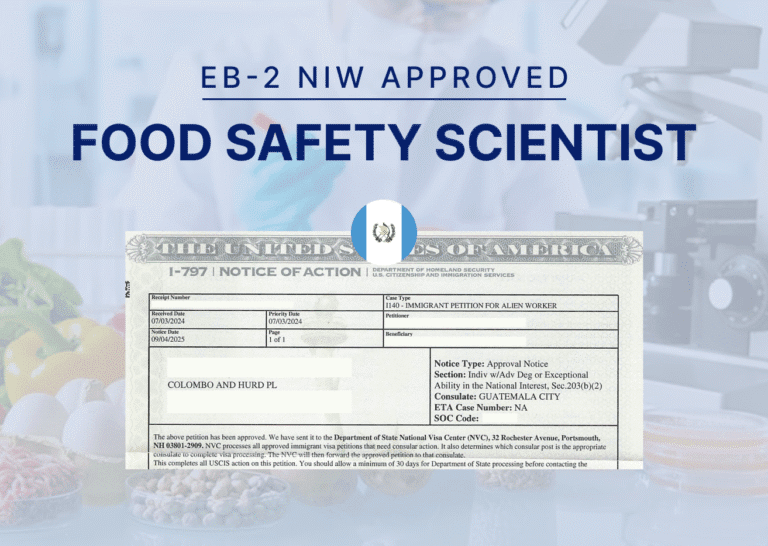Food Safety Scientist
Food safety standards in the United States are set by federal inspectors and laboratories, but the responsibility for food safety often falls on small and medium-sized food processors. These businesses produce and process a large share of the nation’s food supply, yet many lack the dedicated staff to navigate complex regulations.
The gap between regulatory requirements and practical implementation creates real vulnerabilities in the nation’s food system. Our client’s mission is to bridge this gap by helping food processing companies strengthen their compliance programs. When a single outbreak can put consumers at risk and cost industries millions, his work to raise food safety standards becomes all the more critical.
Recently, Colombo & Hurd attorney David A. Santiago helped this professional navigate the EB-2 National Interest Waiver (NIW) process. Our client from Guatemala brought eight years of hands-on experience with U.S. Department of Agriculture (USDA) and Food and Drug Administration (FDA) compliance, breakthrough research in pathogen elimination, and a clear plan to serve the underserved small and medium-sized enterprise (SME) market. Mr. Santiago explained the motivation behind this case, noting that “we really wanted to emphasize the multi-layered economic, safety, and health benefits that the Petitioner could bring to better improve the U.S. food industry.”
On September 4, 2025, United States Citizenship and Immigration Services (USCIS) approved his petition without requesting additional evidence.

A Career Devoted to Food Safety

Our client has focused his career on raising food safety standards in the United States by helping small and medium-sized food processing companies strengthen their compliance programs. His education in food and animal science, including a Ph.D., gave him the foundation to pursue his endeavor of improving food safety.
Beyond his academic credentials, he built over eight years of experience managing quality assurance operations, ensuring compliance with USDA and FDA regulations, and advancing research. One of his most notable achievements involved using industrial microwave technology to eliminate pathogens in food products, an innovation with immediate applications for processors across the industry. His work had been published in academic journals and recognized by peers for its practical value and commercial potential.
Serving a Vulnerable Market in the Food Safety Sector
The client’s goal was to focus on the SMEs that process a significant portion of America’s food supply. Unlike large corporations, SMEs rarely have dedicated food safety departments, leaving them vulnerable to compliance issues and contamination risks. The challenge of this case was clear: how to design food safety programs that are practical, affordable, and include bilingual training, while also strong enough to meet federal standards. Just as important, these programs needed to be scalable, so that what worked in one plant could serve as a model for others across the country.
To meet this challenge, he set out to design tailored Hazard Analysis Critical Control Point (HACCP) plans, provide training, and help SMEs build programs that would bring them into compliance and reduce risks. Mr. Santiago noted that “he was not only helping small and medium-sized businesses in the food industry, he also wants to create customized plans that will support disease prevention to Americans and promote a better quality of life through safer food consumption.”
To achieve that goal, he needed the independence to consult widely and build long-term partnerships across the industry. The EB-2 NIW offered a path that would allow him to deliver these services at scale and fully realize his vision for improving food safety.
Building a Compelling Case
Attorney David A. Santiago emphasized how our client’s expertise fit into broader national priorities. Foodborne illness sickens 600 million people worldwide each year, and in the United States it costs billions in healthcare expenses. His work directly supported the federal government’s strategy to enhance food security by improving the safety and resilience of the food supply.
SMEs were at the center of his proposed endeavor. These businesses are vital to food systems, providing essential nutrition and food security, yet they often lack the expertise to meet regulatory requirements on their own. By offering tailored programs, he was positioned to address a critical gap in the nation’s food safety infrastructure.
We also highlighted industry interest in the client’s work, showcasing the clear demand for his skills. A beef processing company expressed interest in forming a partnership to deliver comprehensive food safety solutions across its industry network. Similarly, a poultry producer requested training and consulting services to strengthen their practices and ensure regulatory compliance. A professor from a major university’s Department of Animal and Food Sciences also sought collaboration, recognizing both the commercial value and the practical applications of his expertise.
Recognizing that “his innovative strategies would help modernize the overall U.S. food industry,” Mr. Santiago highlighted these endorsements to demonstrate that the client’s proposed endeavor was ready to be implemented in the United States.
See if you qualify
Get your free EB-2 NIW visa profile evaluation today.
EB-2 NIW Approval Without RFE
USCIS approved our client’s EB-2 NIW petition without issuing a Request for Evidence (RFE). This outcome reflects the strength of both his qualifications and the petition’s presentation. Because RFEs are so common in many EB-2 NIW cases, avoiding one is a clear sign of compelling evidence and clear argumentation.
With this approval, our client can now establish a consulting practice that provides specialized support to SMEs nationwide. His programs will strengthen compliance, reduce foodborne illness risks, and bring advanced research into practical use for the businesses that form the backbone of the food supply chain. His clients will benefit from customized solutions that meet their specific operational needs while ensuring compliance with complex federal standards. As Mr. Santiago explained, “we need professionals with these skills to keep the U.S. in the forefront of health, safety, and innovation.”
With industry leaders expressing interest in collaboration, our client’s proposal is positioned for real-world application. As our client establishes his practice, he’ll contribute to the federal goal of enhancing food safety while strengthening the economic competitiveness of a sector that employs millions of Americans.
If you’d like to explore whether an EB-2 NIW could support your own professional goals, we offer a free evaluation here.
“With this case, we really wanted to emphasize the multi-layered economic, safety, and health benefits that the Petitioner could bring to better improve the U.S. food industry. He was not only helping small and medium-sized businesses in the food industry, he also wants to create customized plans that will support disease prevention to Americans and promote a better quality of life through safer food consumption from its conception.”

